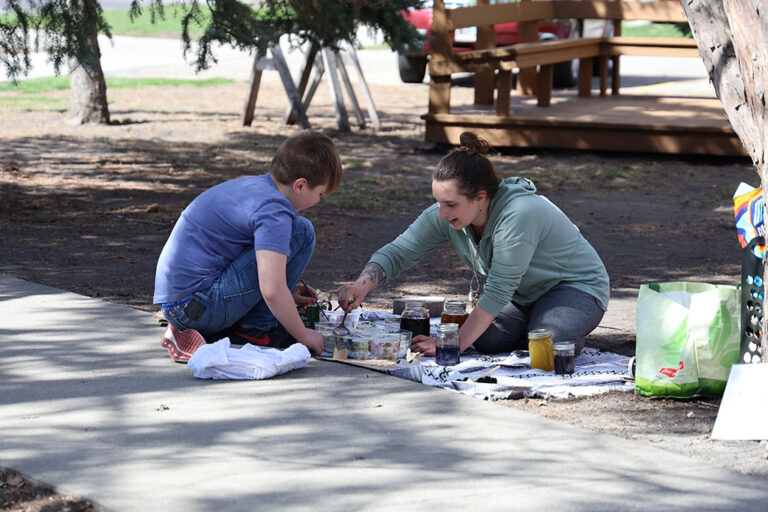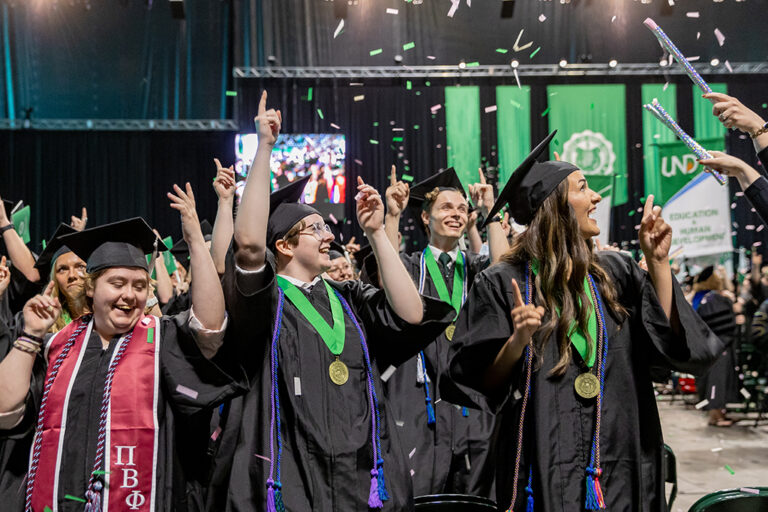Student organizations play big role in retention
Involvement fosters a sense of belonging that helps keep students on campus

Student Ambassadors. Ski and Snowboard Club. Women in Aviation. Chi Alpha ministry. Air Race Classic Team.
These are the student-run organizations at the University of North Dakota that sophomore Katia Peters is either an active member of or applying to join this semester.
That is in addition to her internship at the Student Involvement Office, where the Morden, Man., native helps organize various events.
“I’m definitely involved in a lot of things, and I think also my job helps put me out there,” said Peters, who is double majoring in aviation management and commercial aviation, while also pursuing a language certificate in French.
Being out there – even if that sometimes means being outside of her comfort zone – has brought Peters a group of supportive friends, which she lacked when she arrived on campus as an international student.
“When I first came to UND, I didn’t know anybody – like, at all,” said Peters. “I really wanted to get to know people and create a community for myself. I can go to them if I need help because I’ve gotten that close with some people.”
With Peters, as with countless other students, those connections were a huge part of her choosing to stay at UND.
For example, Peters faced that choice when a Career Fair experience turned out to be less promising than she had hoped.
Peters had wanted a professional opportunity with an aviation company. But what she found out was that a lot of U.S. employers do not sponsor international students for paid jobs.
So, Peters thought about quitting UND. After all, she thought, what was the point of going to school here if she couldn’t find a good internship to enhance her studies?
“That was very discouraging, but a friend whom I work with knew about a company that hires international students, and she reached out to them for me,” Peters said.
“Doing that makes me feel like I’m a part of campus, and UND is the university where I’m supposed to be.”
From belonging to staying
That sense of belonging is what student involvement should foster, said Stephanie Lee, coordinator of student organizations and programs. It also leads to better retention of freshmen, who often weave their strongest network of friends and mentors in student clubs, societies and Greek sororities and fraternities.

“Research shows that students who are involved on campus have higher rates of retention,” said Lee. “They have higher academics.”
Now, UND has its own institutional data to back up Lee’s assertion. For instance, according to the Office of University Analytics & Planning, the fall-to-fall retention of the 2018 cohort peaked at 82 percent for students in Greek houses, compared to about 78 percent for those not part of a fraternity or a sorority.
Year of Retention connection
Under the leadership of Tom DiLorenzo, UND provost and vice president of academic affairs, the 2019-20 academic year is unfolding under the banner of “The Year of Retention,” with a concerted, campus-wide effort to improve retention rates.

The initiative, prompted by this year’s slight drop in retention numbers (which mean fewer first-year students who returned as sophomores), involves – among other policy efforts – the use of digital tools and high-impact practices to help students succeed academically.
Success outside of the classroom is equally crucial. Through mentoring student organizations, organizing social events, and meeting with students one-on-one, Lee said she encounters a plethora of ordeals that prompt students to consider dropping out. These range from financial challenges to unfamiliarity with offered services to social isolation.
Involvement, Lee said, often helps overcome such stumbling blocks.
“When you find something that you’re interested in, it’s going to help with your sense of belonging and your purpose in being here and, in turn, it will accelerate you in athletics, or academics, and pretty much anything else that you do,” Lee said.
Lee, who obtained both her bachelor’s and master’s degrees from UND, offered a personal example of how significant clubs and organizations can be for students.
Originally from New York, Lee arrived at UND as a freshman not knowing anyone. Her roommate would often leave for the weekends, and she would spend the days alone in her room.
But then, Lee made a friend who pushed her to “put herself out there.”
“I started getting involved in student organizations with her,” Lee said. “And honestly, I think that’s why I stayed. I was connecting with people and finding my sense of belonging on campus and what that meant. I think a lot of students experience that, but they don’t necessarily verbalize it.”
But, today’s UND students do not solely seek connections. These students are eager to build the circuits that generate those links. This year saw the establishment of nearly 20 new student organizations.
“I think this generation of students wants to have a purpose in what they’re doing,” said Lee. “Through student organizations and just general involvement, they find a purpose as well as skills that they can use outside of the classroom to further their careers down the road.”


